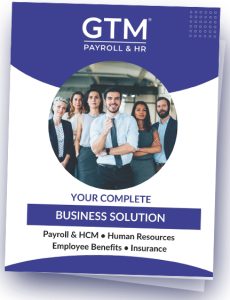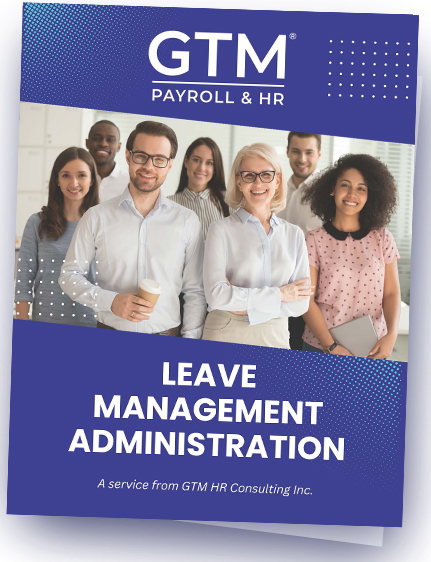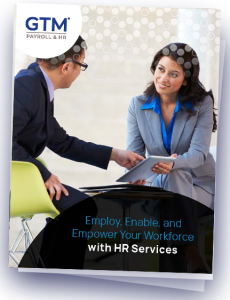
HR Audit Service
Is Your Business at Risk?
When did you last review your employee handbook or evaluate your HR practices? Are you at risk for non-compliance with current labor laws, which could mean fines or penalties? These questions and more can be answered with an HR audit.
What is an HR Audit?
An HR audit is a comprehensive review of an organization’s human resources policies, practices, procedures, and systems to identify improvement areas and ensure compliance with legal and regulatory requirements. It is an objective examination conducted internally to identify and remedy possible exposure.
When you conduct an HR audit you can look into one or more areas, depending on your concerns, budget, and time frame. Areas can include compliance, best practices, performance, and competitiveness.
HR audits are done as part of a risk management prevention tool. Periodic internal audits, or self-checks, are the most diligent way to protect against Department of Labor findings during a state-conducted audit. Employee records, including time records, employee personnel files, and Form I-9 review, will be reviewed.
An HR audit is one of the only ways to fully assess whether your HR processes and policies comply with federal and state laws. For example, an audit of all your organization’s Form I-9s can identify and correct deficiencies. Similarly, HR records can be audited to identify commingled records, allowing your business to prevent penalties proactively.
Certain high-level areas of human resources may not be included in the essential scope of an audit, including strategic relations and workforce planning; recruitment details, cultural and DEI goals; organizational and workflow charts; and HR metrics.
When Should an HR Audit Be Conducted?
If you don’t have the internal HR staff to stay on top of your HR issues and compliance concerns, when and how often should you have an HR audit performed? There are many reasons to begin the process, including:
Periodic Reviews
Regular HR audits, conducted annually or biennially, can help businesses maintain compliance with evolving laws and regulations, stay updated with industry best practices, and identify areas for improvement in HR processes.
Mergers and Acquisitions
Before or during mergers, acquisitions, or significant organizational changes, conducting an HR audit can help ensure the smooth integration of HR practices, policies, and cultures, and identify any potential liabilities or risks associated with the transition.
Leadership Changes
When there are changes in leadership within the HR department or at the executive level, an HR audit can help new leaders gain insights into the current state of HR practices, identify areas of concern, and set priorities for improvement.
Legal Compliance Concerns
In response to legal challenges, complaints, or concerns regarding HR practices, businesses may conduct targeted HR audits to assess compliance with specific laws and regulations, such as those related to discrimination, harassment, or wage and hour issues.
Organizational Growth or Downsizing
During periods of rapid growth or downsizing, businesses may conduct HR audits to ensure that HR practices are scalable, adaptable, and aligned with changing workforce needs and organizational goals.
Employee Feedback
In response to feedback from employees, such as surveys, exit interviews, or grievances, businesses may conduct HR audits to address specific concerns, improve employee satisfaction, and enhance the overall employee experience.
Cost Reduction Initiatives
As part of cost reduction or efficiency improvement initiatives, businesses may conduct HR audits to identify opportunities to streamline processes, reduce administrative burden, and optimize resource allocation within the HR function.
Strategic Planning
As part of strategic planning processes, businesses may conduct HR audits to assess the organization’s HR capabilities, identify talent gaps, and align HR strategies with overall business objectives and long-term goals.
Performance Evaluation
As part of performance evaluation processes for HR departments or individual HR professionals, businesses may conduct HR audits to assess the effectiveness of HR practices, identify areas of strength and weakness, and provide feedback for improvement.
HR Audit Topics
The scope of a general HR audit may include the following:
Labor Posters
Ensure you have all required federal, state, and local posters in conspicuous locations, and that your remote employees have access.
Job Postings
Make sure your job postings comply with state and local regulations, including any pay transparency requirements in your location.
Recordkeeping
Look at your document retention practices to ensure you are following recommended guidelines. Review your performance review template and your performance action/discipline template.
Hiring
Look at your job applications and interview process; your background check procedures; your new hire training process; your job offer letter template; your job descriptions; your pay rate acknowledgement document; your employee handbook acknowledgment document; and your harassment training acknowledgment document.
Employee Classification
Employee classification audits are a separate service, but during a general HR audit, it can be determined if such an audit is needed.
Personnel Files
Look at the following in your employee files:
- Job descriptions
- Employment agreements or signed offer letters
- Handbook and other new hire documents
- Performance reviews
- Applicable disciplinary warnings; write ups or PIPs
- Attendance records
- Direct deposit authorization forms
- Employee information including address; ER contact
- Position logs/employment history
- Compensation adjustments
- Payroll status changes
- PTO logs (medical/sick time separate)
- Wage garnishments, including child support
- Contributions authorizations for medical plans, retirement benefits, etc.
- Training and certification records including sexual harassment training log (state-specific)
- Termination record, including any separation agreements and records of COBRA submission
- Properly executed tax withholding forms (W-4s)
Personnel files must not contain any medical records, medical information, or medical benefit enrollment forms. Nor should they contain any ADA or related medical documents.
Medical Files
Review of your employee medical records, which can include but are not limited to:
- Benefit enrollment forms
- Doctors’ notes for absences
- ADA medical authorization and requests
- Forms related to leave of absence
- Medical release to return from work
- Appropriate COVID test results
- GINA Statement
An audit can also look at your HIPAA Policy, as applicable.
Federal Form I-9
Federal Form I-9 is required for all employees, separated into two files: active and terminated employees. It does not apply to independent contractors. Employees are requested to complete an I-9 only after an employee has officially accepted a job offer. The deadline to complete the Form I-9 is day 1 by the employee and day 3 by the employer. Terminated employee Form I-9s must be kept for 7 years.
An audit will verify the following:
- Proper Form I-9 version in use
- Every employee has a completed and properly executed an I-9
- Any errors or omissions
Employee Benefits
An HR audit will look at the following employee benefits that you offer:
- Medical – annual compliance regarding how notices are distributed and how enrollment is tracked
- Dental and vision
- Ancillary plans – documents for FSAs, DCAs, HSAs
- Election/waiver forms – look at your open enrollment process and check if waiver forms are properly executed
- Disability and workers’ compensation
- Paid Family Leave
- EPLI and Unemployment Insurance – verify the existence, not establish coverage threshold
- 401(k) – we will confirm your broker and the existence of fidelity bond; annual compliance on how notices are distributed and enrollment is tracked
Employee Handbook
An HR audit will check your employee handbook to make sure it includes (but is not limited to):
- At-will employment policy
- Fair treatment and complaint procedure
- Workplace conduct
- Sick time policy (state-specific)
- PTO policy with specific note to accrual, carryover, and payout language
- Electronic monitoring and IT policies
- Any state-specific COVID-19 policies, as applicable
- Applicable leave policies including FMLA, DBL, and any other state benefits
Workplace Safety
An HR audit may include a review of your specific policies drafted, including evacuation, workplace safety, and workplace safety manuals, if applicable.
Required Complaint Forms
The audit may ensure you have the following documents:
- Sexual and other harassment complaint procedures and forms, with locations noted in the employee handbook
- Retaliation reporting measures
- Whistleblower complaint forms
- HEROS Act complaint forms, or other state-specific COVID complaint forms
Termination Process
An HR audit will review your termination process checklist, and check your termination letter template to ensure it properly includes information on final pay, COBRA, and PTO.
The COBRA enrollment process will also be reviewed, including your notification and enrollment packet.
Any exit interview templates or materials may also be reviewed.
Benefits of an HR Audit
Identify and mitigate risks
The last thing your business needs is a state labor department audit that reveals numerous compliance violations. An HR audit can pinpoint potential areas of risk within your HR processes, such as discrimination, harassment, or wrongful termination, and allows for proactive measures to mitigate these risks before they escalate, eliminating the exposure of non-compliant practices.
Improve efficiency
An audit can streamline your HR processes and procedures to improve operational efficiency, reducing administrative burden and costs associated with HR functions, while reducing redundancy and human error, which can save time and money. An audit can also assess the effectiveness of your HR practices, identifying areas for improvement and implementing best practices to enhance overall HR performance.
Ensure compliance
An HR audit can ensure that HR policies, procedures, and practices are in compliance with federal, state, and local employment laws and regulations, reducing legal risks and potential penalties, costly legal disputes, and reputational damage.
Identify training and talent needs
An HR audit can improve employee skills and knowledge by identifying gaps in talent acquisition, development, and retention strategies, allowing your organization to address skills shortages and plan for future workforce needs.
Enhance organizational effectiveness
By addressing any issues related to compensation, benefits, or workplace culture, an HR audit can enhance employee morale and satisfaction, leading to higher levels of productivity and retention.
HR Audits Through GTM
When you hire GTM to conduct an HR audit, our HR consultants gather information from your internal HR point of contact, and various brokers or vendors used for insurance and retirement plans. On-site records are physically reviewed, issues are identified, and presented in memo form with a worksheet. Clients are copied on requests for information and kept apprised of the audit status. The timeframe for an audit varies based on your business demands and the time available for audit fact gathering. Findings can be remedied with the assistance of our team.
HR services are offered through GTM HR Consulting Inc.
Interested?
Request more information and a free consultation about our consulting services.
Free Consultation







